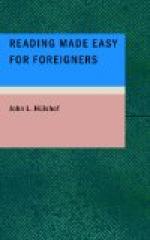This inventive genius has also given us rapid and cheap transportation. In the old days a man had to make or raise most things for himself. Manufactured articles that could be made very cheaply in one place became exceedingly dear when they had to be carried long distances by wagons over poor roads. Many delicate kinds of fruit would spoil on such long journeys. Now, fruit can be sent from California to Maine in fine condition. Cheap and rapid transportation is a great convenience. Business men need not live in the cities near their offices,—the steam or electric cars will carry them eight or ten miles in the time that it would take to walk one mile. The postal service and the telegraph are sure and rapid. So also is the telephone. No wonder, then, that our commerce has reached the fabulous sum of one billion, five hundred million dollars in one year.
What the United States will become tomorrow, will lie in the hands of those who are the children of to-day.
LESSON LVII
PICTURES FROM AMERICAN HISTORY
On the southern bank of the James River in Virginia stand the ruins of an old church. Its crumbling tower and broken arch are almost hidden by the tangled vines which cover it. Within the walls of the church-yard may be found a few ancient tombstones overgrown with ivy and long grass.
This is all that remains of the first English settlement in America,—the colony of Jamestown, Virginia.
This first permanent English settlement in the New World was made in the year 1607, more than a hundred years after the discovery of America by Columbus. Some attempts to colonize had been made by the English before this time. The most important of these was undertaken by the famous but unfortunate Sir Walter Raleigh.
Raleigh obtained from Queen Elizabeth a grant of a vast territory, to be called Virginia, in honor of Elizabeth, the “virgin queen.” It extended from the Hudson River to the boundary of what is now Georgia.
In attempting to colonize Virginia, Raleigh spent a large fortune. But his colonies never prospered. The settlers returned home disgusted with the hardships of the wilderness. In 1589 Raleigh sold his rights to a stock company.
Nevertheless the enterprise which proved too difficult for Raleigh was carried out during Raleigh’s lifetime, under the leadership of the famous John Smith.
The idea of colonizing Virginia had been growing wonderfully. In 1606 a company of “noblemen, gentlemen, and merchants,” called the London Company, obtained from King James the First a charter for “planting and ruling” South Virginia.
The company had gathered together a band of men willing to try their fortunes in Virginia, and they were just about to embark when Smith reached London. To Smith’s bold and roving disposition the idea of a New World was irresistible, and he joined the colonists.




